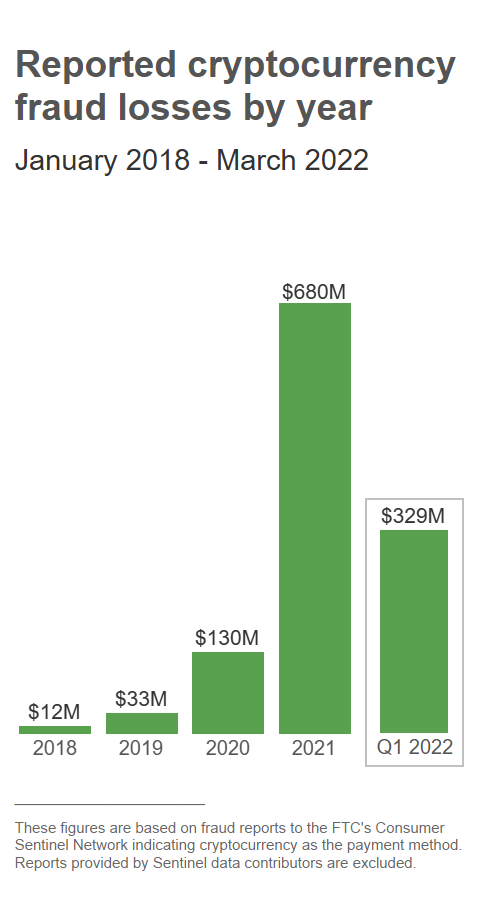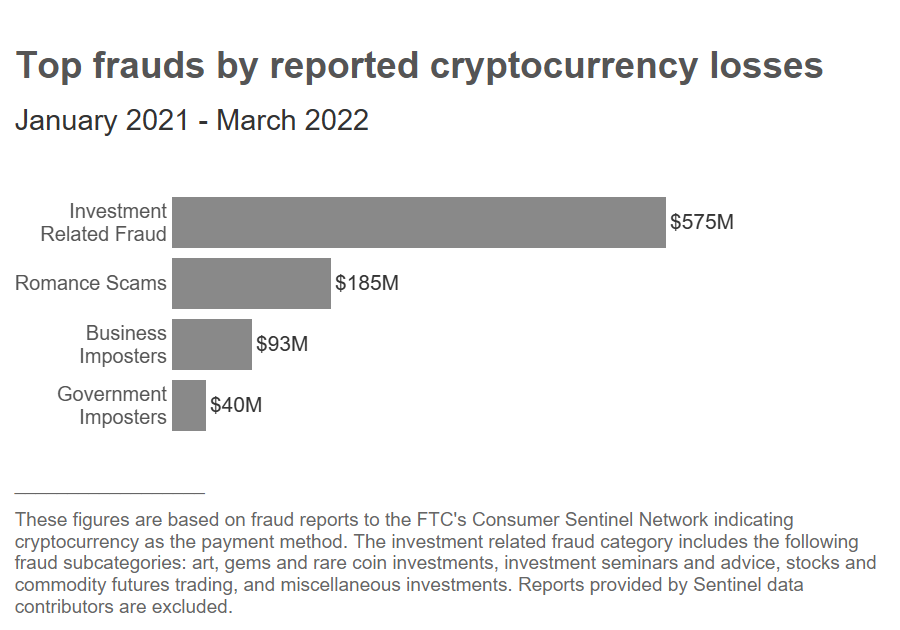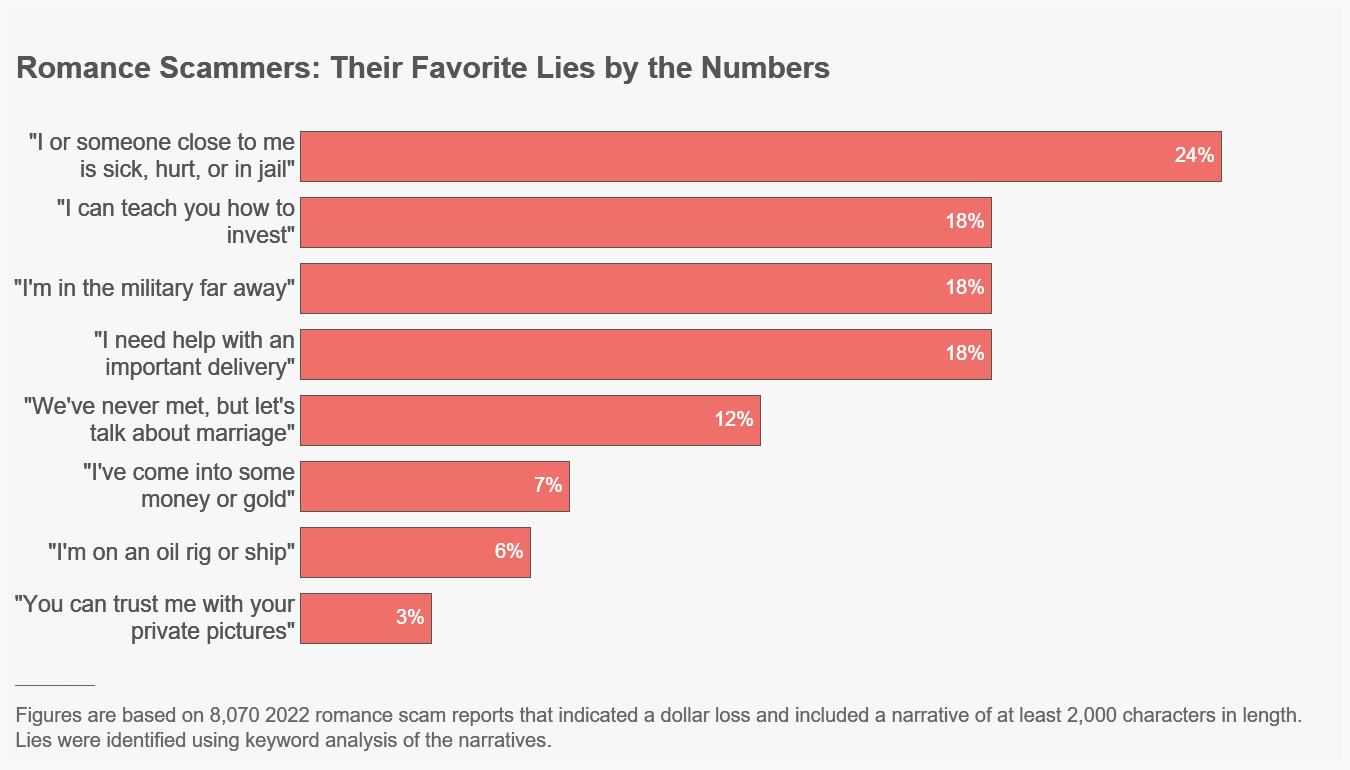
The rise of cryptocurrencies has not only brought innovation but also attracted the attention of scammers looking to take advantage of unsuspecting individuals. With over $1 billion lost to crypto scams in the first half of 2022 alone, it’s crucial that we arm ourselves with knowledge and awareness to safeguard our hard-earned digital assets.
Reports point to social media and crypto as a combustible combination for fraud. Nearly half the people who reported losing crypto to a scam since 2021 said it started with an ad, post, or message on a social media platform. – https://www.ftc.gov/


https://www.ftc.gov/news-events/data-visualizations/data-spotlight/2022/06/reports-show-scammers-cashing-crypto-craze
Here are some prevalent crypto scams to watch out for in 2023:
1. Phishing scams:
Scammers employ phishing tactics to deceive you into sharing your private information, such as crypto wallet keys. Be vigilant and skeptical of emails or messages that request login credentials or sensitive data. Always double-check the authenticity of the communication before taking any action.
2. Ponzi schemes:
Ponzi schemes lure investors by promising high returns in a short amount of time, with little effort. Be aware that any investment that offers unbelievably high returns is likely a scam. Beware of any investment opportunities that require you to recruit other people or involve pyramid structures.
3. Exit scams:
These occur when an ICO or crypto exchange suddenly goes dark and disappears with your funds. Do your research on the team or company behind the project, and if it’s too good to be true, it probably is. Additionally, make sure you spread out any investments across multiple platforms to reduce risk.
4. Blackmail and extortion scams:
Scammers may claim to possess compromising personal information and demand crypto payments to prevent its release. If you encounter such threats, report them immediately to the Federal Bureau of Investigation (FBI) and avoid engaging with the scammers.
5. “Business opportunity” scams:
Beware of promises of guaranteed returns or exceptional profits. Scammers may entice you with the allure of multiplying your crypto assets overnight. Remember, legitimate investments come with risks, and if it sounds too good to be true, it probably is.

6. Giveaway scams:
Be cautious of offers promising free crypto or prizes. Scammers often impersonate well-known figures like celebrities or influencers to gain your trust. Remember, legitimate giveaways typically have clear rules and guidelines, and you should never have to send crypto to receive a reward.
7. Impersonation scams:
Scammers may pose as government officials, law enforcement, or representatives from reputable companies to convince you to part with your crypto. Always verify the authenticity of their claims independently, and never share your crypto with anyone you cannot trust explicitly.
8. Investment scams:
Exercise prudence when approached with investment opportunities that require sending crypto to unfamiliar accounts or downloading suspicious apps. Take the time to conduct thorough research and seek advice from trusted sources before making any investment decisions.
9. Pump and dump schemes:
Scammers artificially inflate the price of a particular cryptocurrency through social media hype, only to sell their holdings at the peak, leaving unsuspecting investors with significant losses. Stay informed and make decisions based on sound research and analysis.
10. Romance scams:
Be cautious of individuals who develop an online relationship with the intention of tricking you into making crypto payments or investments. Don’t let emotions cloud your judgment and remain vigilant when engaging in online relationships.
11. Fake job listing scams:
Scammers create enticing job offers, particularly in the crypto field, requiring upfront crypto payments. Exercise caution and avoid sending any payments before thoroughly researching the legitimacy of the opportunity.

https://www.ftc.gov/news-events/data-visualizations/data-spotlight/2023/02/romance-scammers-favorite-lies-exposed
How to report crypto scams
Whether you believe you have spotted a crypto scam or you’re already caught up in one, it’s your duty to report it. The following contacts can help you put scammers behind bars where they belong:
- Commodity Futures Trading Commission (CFTC) at CFTC.gov/complaint.
- Federal Bureau of Investigation (FBI) at https://www.fbi.gov/contact-us.
- Federal Trade Commission (FTC) at ReportFraud.ftc.gov.
- Internet Crime Complaint Center (IC3) at ic3.gov/Home/FileComplaint.
- U.S. Securities and Exchange Commission (SEC) at sec.gov/tcr.
To protect your digital assets and avoid falling victim to crypto scams, remember these key tips:
- If an opportunity seems too good to be true, it probably is.
-
Research thoroughly before making any investment decisions.
-
Never share your private keys or sensitive information with anyone you don’t trust explicitly.
-
Be wary of unsolicited communications, and verify the authenticity independently.
-
Report any scams or suspicious activities to the relevant authorities.
Knowledge is power, and by staying informed and spreading awareness within our community, we can collectively thwart the efforts of scammers and ensure a safer crypto ecosystem for everyone.
Resources
- https://www.ftc.gov/news-events/data-visualizations/data-spotlight/2022/06/reports-show-scammers-cashing-crypto-craze
- https://www.ftc.gov/news-events/data-visualizations/data-spotlight/2023/02/romance-scammers-favorite-lies-exposed
- https://time.com/personal-finance/article/popular-crypto-scams/





